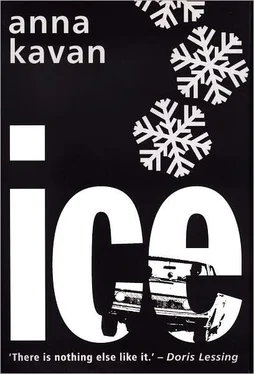All round me people were walking away, stamping their feet in the cold. I hardly noticed the mass departure. It did not occur to me to leave the edge of the water, over which I continued to gaze at the vessel’s diminishing shape. I had been an utter fool. I was furious with myself for letting it go without discovering the identity of the girl on board. Now I would never be sure whether she had, or had not, been the right one. And if she had been, how would I ever find her again? A mournful hoot travelled across the water: the ship was leaving the protection of the harbour, heading out into the open sea. Already meeting the off-shore rollers, it kept disappearing behind grey masses of water surging along the horizon. It looked absurdly small, a toy boat. I lost sight of it, my eyes could not find it again. It was lost irretrievably.
I only became aware that everyone else had gone and that I was alone there, when two policemen approached, marching along side by side, and pointed to a sign, ‘Loitering on the waterfront strictly forbidden: War Department.’ ‘Why are you hanging about here? Can’t you read?’ Needless to say, they refused to believe that I had not seen it. Hugely tall in their helmets, they stood on each side, so close that their guns stuck into me, and demanded my papers. These were in order. There was nothing against me. Nevertheless, my conduct had been suspicious, they insisted on writing down my name and address. Again I had acted stupidly, this time by drawing attention to myself. Now that my name had been noted, it would appear in the records; I would be known to the police everywhere, my movements would be kept under observation. It would be a serious handicap in my search.
As the two men hustled me through the gates, something made me look up at a row of big black-backed gulls perched on a wall, all facing into the wind and pointing out to sea, as motionless as if they had been stuffed and put up there to act as a message. On the spot I decided to leave the country before any of my visas lapsed or were cancelled. No particular place seemed more or less promising than another as a base from which to start searching. But to attempt to operate from here while under suspicion would surely invite failure.
I had to leave at once, before the police report circulated. It could not have been done through the normal channels. By employing other methods, I managed to board a northbound cargo boat carrying a few passengers, and booked to the end of the voyage. The purser was willing to vacate his cabin for a consideration. Next day, at the first port of the trip, I went on deck to watch our arrival. I remembered the complaints I had been forced to listen to about overcrowding when I saw a lot of people packed together on the deck below, waiting to disembark. Twelve was the authorized number of passengers. I wondered how many more were on board.
It was extremely cold. Loose fragments of pack ice drifted past in the green water. Everything was misty and indistinct. The landing-stage was quite close, but the buildings at the end of the jetty looked insubstantial, amorphous. A girl in a heavy grey coat with a hood was standing a little apart from the other passengers, leaning on the rail. Occasionally a fold of the coat would blow back, showing a quilted check lining. It was the coat I noticed; although I knew perfectly well that such coats had become almost a uniform among women since the start of the cold, and were to be seen everywhere.
The mist began to lift and break up, the sun would shine later. A rugged coastline appeared with many inlets and jagged rocks, snow-covered mountains behind. There were many small islands, some of which floated up and became clouds, while formations of cloud or mist descended and anchored themselves in the sea. The white snowy landscape below, and above the canopy of misty white light, the effect of an oriental painting, nothing solid about it. The town appeared to consist of ruins collapsing on one another in shapeless disorder, a town of sandcastles, wrecked by the tide. A great wall which had protected it was broken in many places, both ends subsiding uselessly into the water. The place had once been important. Its fortifications had lain in ruins for centuries. It was still of some historical interest.
Sudden silence fell. The engines had stopped. The boat was still moving forward under its own momentum. I heard the faint swish of water against the sides, the plangent crying of sea birds, that sad northern sound. Otherwise all was silent. No sounds of traffic, of bells or voices, came from the land. The town of ruins waited in utter silence under the brooding mountains. I thought of long narrow ancient ships, vast collections of loot preserved in barrows, winged helmets, drinking horns, great heavy ornaments of gold and silver, piles of fossilized bones. It looked a place of the past, of the dead.
There was a shout from the bridge. On the jetty a group of sullen-faced men rose out of the ground. They were armed and wore uniform: black padded tunics, belted tight at the waist, high boots, fur caps. The knives in their belts caught the light as they moved. They looked outlandish, even menacing. I heard somebody say they were the warden’s men, which meant nothing; I had not heard of this warden. Their presence surprised me since private armies were forbidden by law. Ropes were thrown; they caught them and made them fast. The gangway crashed down. A slight stir started among the passengers, who picked up luggage, got out passports and papers, began a slow shuffling progress towards a barrier that had been set up.
Only the girl in the grey coat did not concern herself with landing, did not change her position. As the others moved forward and she was left isolated, my interest increased, I could not detach my attention from her, kept on watching. What most struck me was her complete stillness. Such a passive attitude, suggesting both resistance and resignation, did not seem entirely normal in a young girl. She could not have been more motionless if she had been tied to the rail, and I thought how easily bonds could be hidden by the voluminous coat.
A bright strand of glittering blonde hair, almost white, escaped from the hood and blew loose in the wind; I felt a sudden excitement; but reminded myself that many northerners were extremely fair. All the same, my interest now became compelling, I was longing to see her face. She would have to look up towards me before that could happen.
The passengers’ forward movement was interrupted. Men in uniform came aboard and cleared a way through them, demanding room for the warden, shouting peremptory orders. Space was made for a tall man, yellow-haired, handsome in a tough, hawk-hard northern fashion, his height jutting above those near him. His arrogant manner, his total disregard for the feelings of others, made an unpleasant impression. As if he sensed my criticism, he glanced up for a second. His eyes were startling pieces of bright blue ice. I saw that he was making for the girl in the grey coat, the one person who had not seen him. Everyone else was staring. When he called out, ‘Why are you standing there? Have you gone to sleep?’ she swung round as if terribly startled. ‘Hurry up! The car’s waiting.’ He went close and touched her. He was smiling, but I detected a hint of a threat in his voice and behaviour. She hung back, seemed unwilling to go with him. He linked arms with her, apparently friendly, but really forcing her forward against her will, pulling her along with him through the bunched, staring people. She still did not look up, I could not see her expression, but I could imagine his iron grip on her thin wrist. They left the ship before anyone else, and were immediately driven off in a big black car.
I had been standing there as if petrified. Suddenly now I made a decision. It seemed worth taking a chance. Though without having seen her face. … I had no other clue to follow, in any case.
Читать дальше












